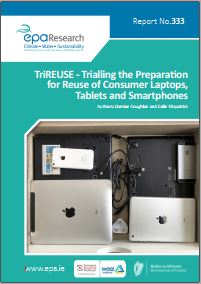Authors: Damian Coughlan and Colin Fitzpatrick
Summary: Information and communication technology (ICT) devices contain critical raw materials. The TriREUSE project aimed to provide an insight into possible reuse rates for WEEE collections that target consumer ICT products with reuse potential. The project involved a series of 10 dedicated collection events that encouraged people to dispose of old or unwanted data-bearing devices, with the incentive of a free data destruction service.

Watch the TriREUSE project highlights video
The introduction of the Waste Electrical and Electronic Equipment (WEEE) Directive has enabled Ireland to achieve high levels of WEEE recycling. Recycling is important for WEEE, but, with the adoption by the European Commission of a European Union action plan for the circular economy, there is a focus on more sustainable methods of extending product lifetimes in line with the implementation of the circular economy.
The action plan states that, in tandem with legislative proposals on waste and in accordance with the waste hierarchy (to establish a priority order), long- term targets should be set to increase preparation for reuse, as well as recycling of key waste streams and the reduction of landfilling. The current preparation for reuse sector in Ireland is beset by issues and, in line with current European Union policy, there needs to be more focus on how best to increase reuse in Ireland.
European Union policy has highlighted reuse and preparation for reuse as targets for future legislation in the WEEE Directive. Current rates of preparation for reuse in Ireland are low and alternatives to the existing system are needed to increase collection rates.
This project presented a preparation for reuse trial, which utilised free data erasure and destruction for data-bearing devices, including laptops, tablets and smartphones. These types of devices do not present at normal WEEE takeback facilities owing to the “closet effect”, whereby consumers hoard devices at home but no longer use them. It has been shown that consumers have a connection to the content on these devices. Content such as photographs, videos or music creates a barrier to returning devices for reuse and recycling, and consumers also expressed concerns about the data protection of their devices. These barriers to returning devices for reuse were investigated during this trial using a trust model to encourage and incentivise owners of WEEE to return their devices using a safe and secure process.
These data-bearing devices are important in that, if returned within a shorter time frame, they will:
The current Information Technology Asset Disposal (ITAD) sector in the main deals with businesses for the collection of electrical and electronic equipment. The TriREUSE project proposed the adoption of preparation for reuse certification by ITAD companies, which will allow the collection of consumer WEEE and has the potential to kickstart and increase preparation for reuse targets in Ireland in line with current European Union policy.
Preparation for reuse can provide an environmental and economic benefit for Ireland. A barrier to sending devices for preparation for reuse is the presence of personal data; this is particularly the case for difficult-to-collect devices (laptops, tablets and smartphones). These devices can have a high intrinsic value and can enjoy a second life but they also contain many important critical raw materials, as designated by the European Commission. The research identified the following solutions: